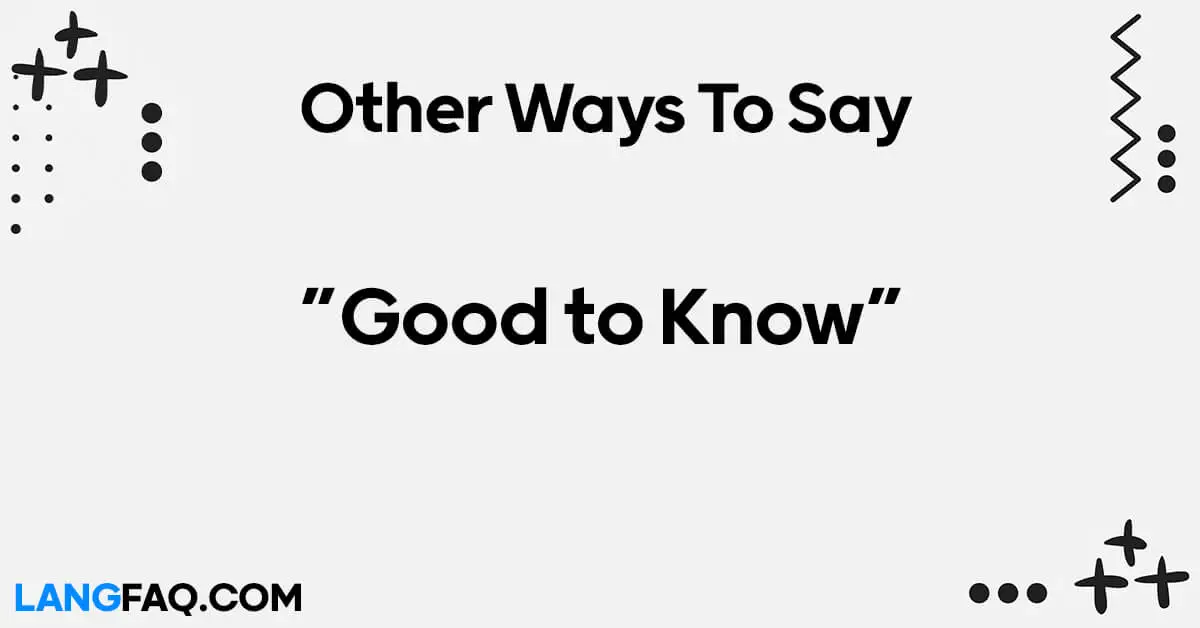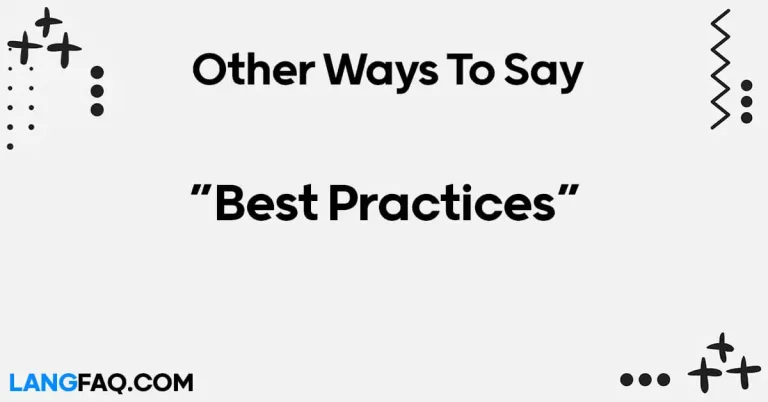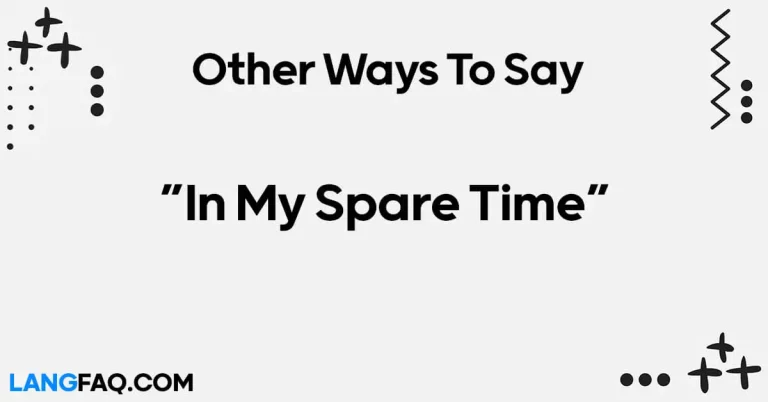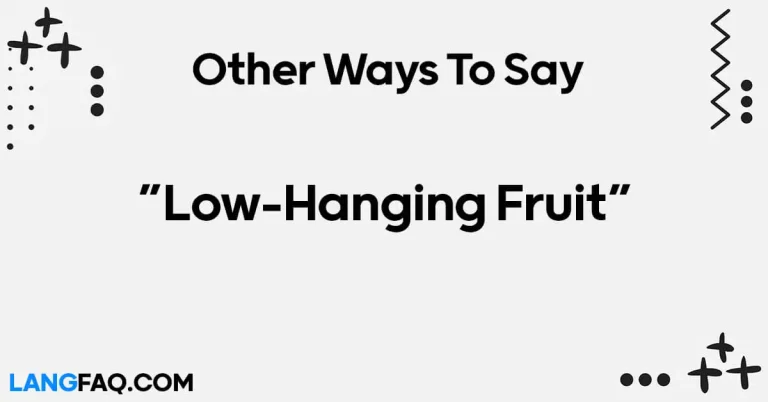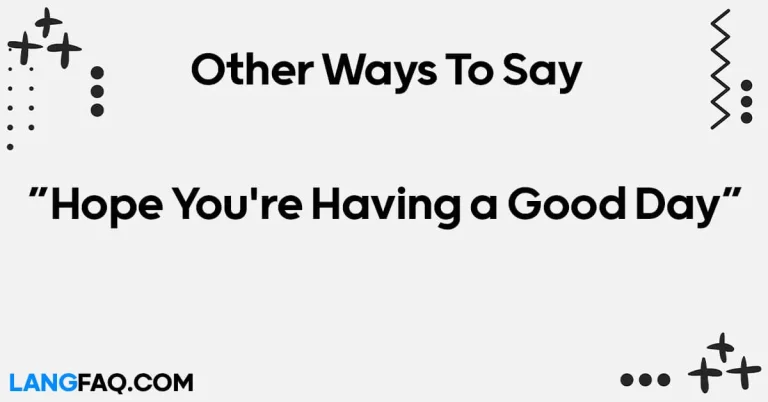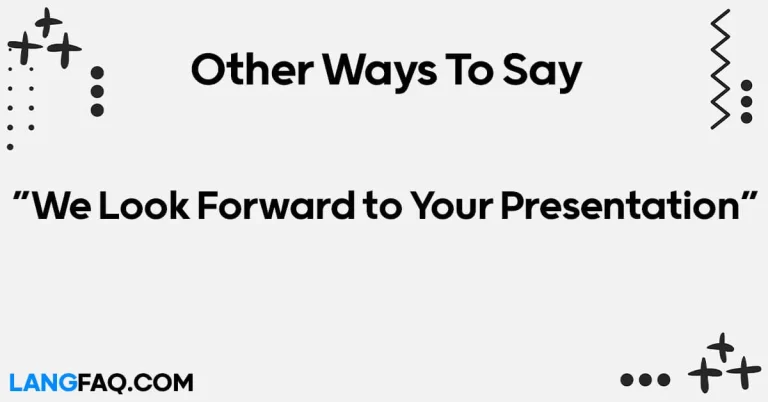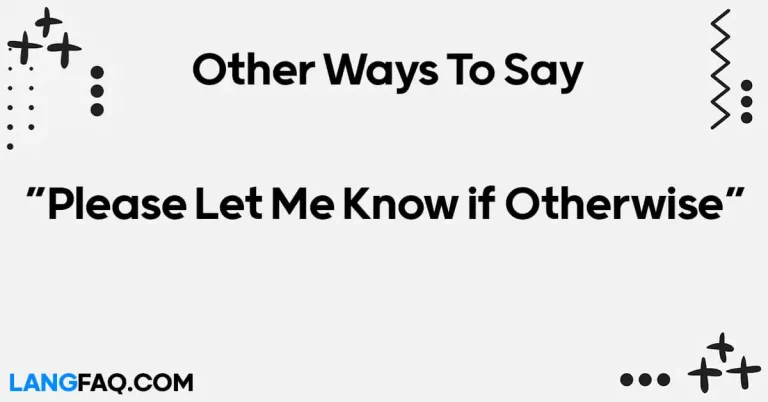In a world overflowing with information, expressing acknowledgment or agreement goes beyond the mundane “Good to Know.” Let’s delve into alternatives that not only enrich your vocabulary but also add a touch of creativity to your conversations.
12 Other Ways to Say “Good to Know”
Here are 12 other ways to say “Good to Know”:
- Noted
- I’m aware
- I’ve got the gist
- That’s enlightening
- I appreciate the insight
- I’ll take note of that
- I’ll incorporate that into my knowledge base
- I’m well-versed
- I’m familiar with that
- That sheds light on things
- I’m cognizant of that
- That’s uplifting to know
Here’s a table with meanings and examples for the 12 other ways to say “Good to Know”:
| Expression | Meaning | Example |
|---|---|---|
| Noted | Acknowledging information | “Your suggestion is noted, and we will consider it.” |
| I’m aware | Conscious of the given information | “I’m aware of the changes in the schedule.” |
| I’ve got the gist | Understand the main point | “I’ve got the gist of the presentation.” |
| That’s enlightening | Providing valuable information or insight | “Your explanation was enlightening.” |
| I appreciate the insight | Expressing gratitude for the shared knowledge | “I appreciate the insight you’ve provided.” |
| I’ll take note of that | Making a mental or written note of information | “I’ll take note of that suggestion.” |
| I’ll incorporate that into my knowledge base | Integrating new information into existing knowledge | “I’ll incorporate that into my knowledge base for future reference.” |
| I’m well-versed | Knowledgeable or experienced in a particular area | “I’m well-versed in the history of the company.” |
| I’m familiar with that | Having knowledge or awareness of something | “I’m familiar with the new software features.” |
| That sheds light on things | Provides clarity or understanding | “Your explanation really sheds light on things.” |
| I’m cognizant of that | Being aware or mindful of a situation | “I’m cognizant of the challenges we might face.” |
| That’s uplifting to know | Positive and encouraging information | “That’s uplifting to know our efforts are making a difference.” |
Expanding your vocabulary with these expressions not only adds variety to your communication but also allows you to convey acknowledgment and understanding in diverse and nuanced ways. Utilizing these alternatives can enrich your conversations and make your responses more engaging.
Is It Correct to Say “Good to Know”?
Absolutely! The phrase “Good to Know” is correct and commonly used in English. It’s a versatile expression that conveys acknowledgment or appreciation of shared information. This phrase is often employed in various contexts, both formal and informal.
Formal Contexts:
- In professional settings, you might use “Good to Know” as a polite acknowledgment when receiving important updates or information from colleagues or superiors.
- Example: After a team briefing on project updates, you might respond with, “Thank you for the detailed overview. Good to know about the upcoming changes.”
Informal Contexts:
- In casual conversations among friends or family, “Good to Know” is often used to express interest or acknowledgment when someone shares personal or interesting information.
- Example: A friend informs you about an upcoming event, and you respond with, “Oh, that sounds fun! Good to know. I’ll mark it on my calendar.”
Email Communication:
- In emails, “Good to Know” serves as a concise and friendly way to acknowledge information.
- Example: Responding to a colleague’s email with new guidelines, you might write, “Thanks for sharing the updated guidelines. Good to know; I’ll adhere to these changes in my upcoming tasks.”
Professional Mail Example With “Good to Know”
Subject: Updated Meeting Schedule
Dear [Recipient’s Name],
I hope this email finds you well. I wanted to inform you about some changes in the upcoming meeting schedule.
The weekly team meeting, originally scheduled for Fridays at 2:00 PM, will now be moved to Wednesdays at 10:00 AM, starting from next week. This adjustment is aimed at accommodating the availability of key stakeholders and ensuring maximum participation.
I understand that schedule changes can be impactful, and I appreciate your flexibility in adapting to these updates. Your commitment to maintaining effective communication within the team is crucial, and I believe these adjustments will contribute to more productive and collaborative meetings.
If you have any concerns or conflicts with the new schedule, please feel free to reach out to me or our team coordinator. Your feedback is valuable in ensuring a smooth transition.
Thank you for your understanding and cooperation. Good to know that we can count on your continued dedication to our team’s success.
Best regards,
[Your Full Name] [Your Position] [Your Contact Information]
Noted: Acknowledging Information
When you want to convey that you’ve acknowledged information in a concise and professional manner, the word “Noted” is a powerful choice. This expression is commonly used in formal settings, both written and spoken, to indicate that you have received and understood the given information.
Example: Dialogue Snippet: Colleague: “We need your feedback on the latest proposal.” You: “Noted, I’ll review it by the end of the day.”
Email Sample:
Subject: Re: Proposal Feedback
Dear [Colleague’s Name],
Thank you for reaching out. I’ve noted your request for feedback on the latest proposal and will review it promptly.
Best regards, [Your Name]
Variations:
- Formal: “Noted with thanks.”
- Informal (with friends): “Got it, thanks!”
Dictionary Insight: According to Cambridge Dictionary, “Noted” means “recorded, especially in writing.”
Usage Tip: Use “Noted” when you want to acknowledge information formally and professionally. It is widely accepted in professional emails and written communication.
I’m Aware: Conscious Acknowledgment
“I’m aware” is a versatile phrase suitable for both formal and informal contexts. It indicates that you are conscious of the information presented. This expression is useful when you want to convey a sense of understanding without delving into extensive details.
Example: Dialogue Snippet: Friend: “The party starts at 7 PM, don’t be late.” You: “I’m aware, I’ll be there on time.”
Email Sample:
Subject: Re: Party Details
Hi [Friend’s Name],
Thanks for the info. I’m aware of the party details and will be there on time.
Cheers, [Your Name]
Variations:
- Casual: “Gotcha, I’m on it.”
- Formal (in a meeting): “I’m aware of the current statistics; let’s discuss the next steps.”
Dictionary Insight: “I’m aware” signifies having knowledge or perception, as defined by Cambridge Dictionary.
Usage Tip: Use this phrase when you want to express acknowledgment without providing an extensive response. It’s a polite and concise way of saying you understand.
I’ve Got the Gist: Understanding the Main Point
If you want to convey that you’ve grasped the main idea or point of a conversation or presentation, “I’ve got the gist” is a casual yet effective expression. It’s suitable for both formal and informal situations where you want to assure others that you understand the essential information.
Example: Dialogue Snippet: Colleague: “The project’s main focus is cost optimization.” You: “I’ve got the gist; we’ll concentrate on reducing expenses.”
Email Sample:
Subject: Re: Project Brief
Dear [Colleague’s Name],
Thanks for the update. I’ve got the gist of the project’s main focus on cost optimization.
Best regards, [Your Name]
Variations:
- Informal (with friends): “I’ve got the basic idea, let’s plan accordingly.”
- Formal (in a presentation): “I’ve grasped the main points of your proposal; let’s explore further.”
Dictionary Insight: “Gist” refers to the essential part or main point, according to Cambridge Dictionary.
Usage Tip: Use this phrase when you want to assure others that you understand the fundamental aspects without delving into intricate details.
That’s Enlightening: Providing Valuable Information or Insight
If you want to express appreciation for information that has expanded your understanding, “That’s enlightening” is a sophisticated choice. This phrase is suitable for formal contexts, conveying not just acknowledgment but also a sense of enlightenment.
Example: Dialogue Snippet: Mentor: “The key to successful leadership is effective communication.” You: “That’s enlightening; I’ll focus on improving my communication skills.”
Email Sample:
Subject: Re: Leadership Workshop Insights
Dear [Mentor’s Name],
Thank you for the insightful workshop. That’s enlightening, and I’ll certainly apply these principles to enhance my leadership skills.
Best regards, [Your Name]
Variations:
- Formal: “I find your insights truly enlightening.”
- Informal (with colleagues): “Wow, that’s enlightening; I never thought of it that way!”
Dictionary Insight: “Enlightening” means providing insight or knowledge, as defined by Cambridge Dictionary.
Usage Tip: Use this phrase when you want to express not just acknowledgment but also appreciation for valuable information or insights.
I Appreciate the Insight: Gratitude for Shared Knowledge
When you want to convey not just acknowledgment but also express gratitude for the knowledge shared, “I appreciate the insight” is a courteous and formal expression. It’s particularly useful in professional settings where conveying appreciation is crucial.
Example: Dialogue Snippet: Colleague: “The market trends suggest a shift in consumer preferences.” You: “I appreciate the insight; this will help us adapt our strategies.”
Email Sample:
Subject: Re: Market Trends Discussion
Dear [Colleague’s Name],
Thank you for sharing your insights on the market trends. I appreciate the insight, and we’ll consider these factors in our upcoming strategies.
Best regards, [Your Name]
Variations:
- Formal (in a meeting): “I genuinely appreciate the insight provided by our team members.”
- Casual (with friends): “Thanks for the info; I really appreciate the insight.”
Dictionary Insight: “Appreciate” signifies recognizing the value or quality of something, according to Cambridge Dictionary.
Usage Tip: Use this phrase when you want to convey not just acknowledgment but also genuine gratitude for the valuable information shared.
I’ll Take Note of That: Making a Mental or Written Note
When you want to indicate that you are actively acknowledging information and intend to remember or consider it, “I’ll take note of that” is a proactive and polite expression. It’s suitable for both formal and informal situations.
Example: Dialogue Snippet: Manager: “The client prefers communication via email.” You: “I’ll take note of that; we’ll ensure all correspondence is via email.”
Email Sample:
Subject: Re: Client Communication Preferences
Dear [Manager’s Name],
Thank you for updating us on the client’s communication preferences. I’ll take note of that, and we’ll align our practices accordingly.
Best regards, [Your Name]
Variations:
- Formal: “Noted, I’ll ensure our team is aware of the client’s preference.”
- Informal (with peers): “Got it, I’ll take note of that for our future interactions.”
Dictionary Insight: “To take note of” means to pay attention or give consideration, as defined by Cambridge Dictionary.
Usage Tip: Use this phrase when you want to assure others that you are actively acknowledging and considering the provided information.
I’ll Incorporate That into My Knowledge Base: Integrating New Information
When you want to convey not just acknowledgment but also a commitment to incorporating new information into your existing knowledge, “I’ll incorporate that into my knowledge base” is a formal and proactive expression. It’s suitable for professional contexts.
Example: Dialogue Snippet: Team Member: “We’ve adopted a new project management tool.” You: “I’ll incorporate that into my knowledge base and familiarize myself with the new tool.”
Email Sample:
Subject: Re: Project Management Tool Update
Dear [Team Member’s Name],
Thanks for the update on the new project management tool. I’ll incorporate that into my knowledge base and ensure a smooth transition.
Best regards, [Your Name]
Variations:
- Formal (in a presentation): “I appreciate the update; I’ll incorporate this information into our team’s processes.”
- Informal (with a mentor): “Got it, mentor. I’ll incorporate these insights into my approach.”
Dictionary Insight: “Incorporate” means to include or absorb as part of a whole, according to Cambridge Dictionary.
Usage Tip: Use this phrase when you want to convey not just acknowledgment but also a commitment to integrating the provided information into your existing knowledge.
I’m Well-Versed: Demonstrating Knowledge or Expertise
When you want to acknowledge information and, at the same time, convey a sense of expertise or familiarity with the topic, “I’m well-versed” is a confident and formal choice. It’s suitable for professional contexts where showcasing knowledge is essential.
Example: Dialogue Snippet: Colleague: “The report highlights key industry trends.” You: “I’m well-versed in those trends; let’s discuss their implications for our strategy.”
Email Sample:
Subject: Re: Industry Trends Report
Dear [Colleague’s Name],
Thanks for sharing the industry trends report. I’m well-versed in these trends and look forward to discussing their impact on our strategy.
Best regards, [Your Name]
Variations:
- Formal (in a meeting): “I’m well-versed in the current market dynamics and their impact on our industry.”
- Informal (with peers): “Got it, I’m well-versed in these trends; let’s strategize together.”
Dictionary Insight: “Well-versed” means highly knowledgeable or skilled in a particular subject, according to Cambridge Dictionary.
Usage Tip: Use this phrase when you want to not only acknowledge information but also showcase your familiarity or expertise in the discussed topic.
I’m Familiar with That: Acknowledging Existing Knowledge
When you want to express acknowledgment while emphasizing that you are already familiar with the provided information, “I’m familiar with that” is a polite and formal choice. It’s suitable for both professional and casual contexts.
Example: Dialogue Snippet: Friend: “Have you heard about the upcoming event?” You: “Yes, I’m familiar with that; I’ve already registered.”
Email Sample:
Subject: Re: Event Invitation
Hi [Friend’s Name],
Thanks for the event invitation. I’m familiar with it and have already registered.
Cheers, [Your Name]
Variations:
- Formal: “I’m familiar with the project; I’ve been involved since its inception.”
- Informal (with friends): “Yeah, I’m familiar with that; let’s meet up there!”
Dictionary Insight: “Familiar” means having knowledge or experience of something, as defined by Cambridge Dictionary.
Usage Tip: Use this phrase when you want to acknowledge information while emphasizing that you are already acquainted with the provided details.
That Sheds Light on Things: Providing Clarity or Understanding
If you want to express that the shared information has brought clarity or understanding to a situation, “That sheds light on things” is a sophisticated and formal expression. It’s suitable for professional settings where clarity is essential.
Example: Dialogue Snippet: Supervisor: “The project timeline has been extended.” You: “Thank you for the update; that sheds light on things. I’ll adjust my tasks accordingly.”
Email Sample:
Subject: Re: Project Timeline Extension
Dear [Supervisor’s Name],
I appreciate the update on the project timeline extension. That sheds light on things, and I’ll ensure my tasks align with the adjusted schedule.
Best regards, [Your Name]
Variations:
- Formal: “The additional information you provided truly sheds light on the complexities of the project.”
- Informal (with colleagues): “Got it, that sheds light on why we need to expedite the process.”
Dictionary Insight: “To shed light on” means to make something clear or easy to understand, as per Cambridge Dictionary.
Usage Tip: Use this phrase when you want to express that the provided information has brought clarity or understanding to a previously unclear situation.
I’m Cognizant of That: Being Mindful or Aware
When you want to convey not just acknowledgment but also mindfulness or awareness of a situation, “I’m cognizant of that” is a formal and powerful expression. It’s suitable for professional contexts where being attentive and mindful is crucial.
Example: Dialogue Snippet: Team Member: “We need to address the potential risks.” You: “I’m cognizant of that; let’s conduct a risk assessment.”
Email Sample:
Subject: Re: Risk Mitigation Strategy
Dear [Team Member’s Name],
Thanks for highlighting the need to address potential risks. I’m cognizant of that, and we’ll initiate a thorough risk assessment.
Best regards, [Your Name]
Variations:
- Formal (in a meeting): “I want to assure everyone that I’m cognizant of the challenges we might face and am prepared to address them.”
- Informal (with peers): “Got it, I’m cognizant of the situation; let’s tackle it together.”
Dictionary Insight: “Cognizant” means being aware or conscious of something, according to Cambridge Dictionary.
Usage Tip: Use this phrase when you want to convey not just acknowledgment but also a heightened level of awareness or mindfulness regarding the discussed situation.
That’s Uplifting to Know: Expressing Positivity
When you want to infuse positivity into your acknowledgment, “That’s uplifting to know” is a warm and formal expression. It’s suitable for both professional and personal contexts where conveying positivity is important.
Example: Dialogue Snippet: Colleague: “Our team achieved record sales this quarter.” You: “That’s uplifting to know; congratulations to the team!”
Email Sample:
Subject: Re: Q3 Sales Report
Dear [Colleague’s Name],
I just went through the Q3 sales report. That’s uplifting to know! Congratulations to the entire team on this remarkable achievement.
Best regards, [Your Name]
Variations:
- Formal: “I must say, the progress we’ve made is truly uplifting to know.”
- Informal (with friends): “Wow, that’s so uplifting to know! Let’s celebrate!”
Dictionary Insight: “Uplifting” means making you feel happy or giving you hope, according to Cambridge Dictionary.
Usage Tip: Use this phrase when you want to not only acknowledge information but also convey genuine positivity and enthusiasm.
FAQ
What are some formal alternatives for “Good to Know”?
In professional settings, consider using phrases like “I’ve taken note of that” or “That’s duly noted.”
Can I use these alternatives in casual conversations?
Absolutely! These alternatives work well in both formal and casual settings, adding versatility to your expressions.
How can I make my acknowledgment more positive?
Opt for phrases like “That’s uplifting to know” or “I’m delighted to learn that” to inject positivity into your responses.
Are these alternatives suitable for written communication?
Certainly! These expressions can enhance written communication, adding a touch of sophistication to your written acknowledgments.
Can I mix and match these alternatives?
Absolutely! Experiment with different phrases to find the ones that resonate with your personal style and the context of the conversation.
How can I remember to use these alternatives in daily conversations?
Practice incorporating these alternatives into your daily interactions to make them a natural part of your communication style.
Conclusion
In conclusion, diversifying your expressions beyond the commonplace “Good to Know” not only enhances your communication skills but also adds a personal touch to your interactions. Experiment with these alternatives, and watch how they elevate your conversations to new heights.

